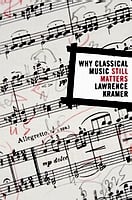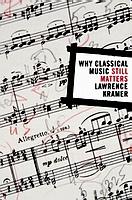This article is excerpted from the new book Why Classical Music Still Matters (University of California Press, 2007).
Brahms’ Clarinet Quintet begins with a consummation. The solo instrument gleams forth over murmuring strings in a single harmonious tone. It melts into a lustrous shimmer, gleams anew, and shimmers again. Then it broadens into a spacious, tranquil melody that slips at the end into the reedy twilight of the instrument’s lower register. For the first moment or two the mood is perfectly blissful, to be tinged — just tinged — by longing or melancholy as the melody expands. What makes this opening so arresting is not just its sheer sensuous beauty but the implication that, starting at a point of fulfillment, there is no place to go but down. The very shape of the passage suggests as much. It is as if the formal necessity of expanding the opening moment into a coherent melody entailed the sacrifice of its lyrical self-sufficiency. This hint is confirmed by everything that follows. The mood of this first movement gradually darkens so that the initial hint of longing becomes charged at the end with deep regret. The clarinet surrenders its melodic self-sufficiency to the strings, which at once introduce qualities of complexity and poignancy that they never surrender. Except in the purely formal repeat of the whole first section, the opening moment of fulfillment is never heard again. It is detached from the rest of the movement to dwell apart in a sphere of its own. Without drama or overt contrast, the passage recedes into the distance while still seeming close by. Throughout the whole movement it hovers tantalizingly just out of reach. The melody comes back, all right, but never intact. It is never quite the same. Why? Why does Brahms tie this music so closely to the melancholy of transience? Among the many possible answers, one has to do with a deep strain of melancholy widely felt to pervade modern life, another with the melancholy of mortality. Brahms was over 60, feeling old and creatively exhausted, when he wrote this music. Both he and his century had only a few years left to live. But another reason may go even deeper, redirecting an awareness of both the beauty and the melancholy inherent in music itself. Whether this was Brahms’ awareness or only something embodied in the music I can’t say. But it points to something that matters deeply about the musical tradition that Brahms inherited and passed down.
My name for that something is old-fashioned; I call it fate. To start getting a sense of it — and getting at its musical sense — we might try shifting from a why? question to a how?
Why? Why does Brahms tie this music so closely to the melancholy of transience? Among the many possible answers, one has to do with a deep strain of melancholy widely felt to pervade modern life, another with the melancholy of mortality. Brahms was over 60, feeling old and creatively exhausted, when he wrote this music. Both he and his century had only a few years left to live. But another reason may go even deeper, redirecting an awareness of both the beauty and the melancholy inherent in music itself. Whether this was Brahms’ awareness or only something embodied in the music I can’t say. But it points to something that matters deeply about the musical tradition that Brahms inherited and passed down.
My name for that something is old-fashioned; I call it fate. To start getting a sense of it — and getting at its musical sense — we might try shifting from a why? question to a how?
Brahms’ Clarinet Quintet begins with a consummation. The solo instrument gleams forth over murmuring strings in a single harmonious tone. It melts into a lustrous shimmer, gleams anew, and shimmers again. Then it broadens into a spacious, tranquil melody that slips at the end into the reedy twilight of the instrument’s lower register. For the first moment or two the mood is perfectly blissful, to be tinged — just tinged — by longing or melancholy as the melody expands. What makes this opening so arresting is not just its sheer sensuous beauty but the implication that, starting at a point of fulfillment, there is no place to go but down. The very shape of the passage suggests as much. It is as if the formal necessity of expanding the opening moment into a coherent melody entailed the sacrifice of its lyrical self-sufficiency. This hint is confirmed by everything that follows. The mood of this first movement gradually darkens so that the initial hint of longing becomes charged at the end with deep regret. The clarinet surrenders its melodic self-sufficiency to the strings, which at once introduce qualities of complexity and poignancy that they never surrender. Except in the purely formal repeat of the whole first section, the opening moment of fulfillment is never heard again. It is detached from the rest of the movement to dwell apart in a sphere of its own. Without drama or overt contrast, the passage recedes into the distance while still seeming close by. Throughout the whole movement it hovers tantalizingly just out of reach. The melody comes back, all right, but never intact. It is never quite the same.
 Why? Why does Brahms tie this music so closely to the melancholy of transience? Among the many possible answers, one has to do with a deep strain of melancholy widely felt to pervade modern life, another with the melancholy of mortality. Brahms was over 60, feeling old and creatively exhausted, when he wrote this music. Both he and his century had only a few years left to live. But another reason may go even deeper, redirecting an awareness of both the beauty and the melancholy inherent in music itself. Whether this was Brahms’ awareness or only something embodied in the music I can’t say. But it points to something that matters deeply about the musical tradition that Brahms inherited and passed down.
My name for that something is old-fashioned; I call it fate. To start getting a sense of it — and getting at its musical sense — we might try shifting from a why? question to a how?
Why? Why does Brahms tie this music so closely to the melancholy of transience? Among the many possible answers, one has to do with a deep strain of melancholy widely felt to pervade modern life, another with the melancholy of mortality. Brahms was over 60, feeling old and creatively exhausted, when he wrote this music. Both he and his century had only a few years left to live. But another reason may go even deeper, redirecting an awareness of both the beauty and the melancholy inherent in music itself. Whether this was Brahms’ awareness or only something embodied in the music I can’t say. But it points to something that matters deeply about the musical tradition that Brahms inherited and passed down.
My name for that something is old-fashioned; I call it fate. To start getting a sense of it — and getting at its musical sense — we might try shifting from a why? question to a how?

